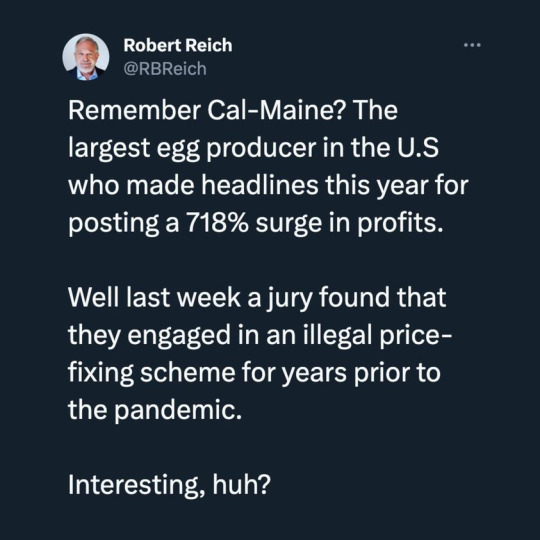#price gouging
Photo
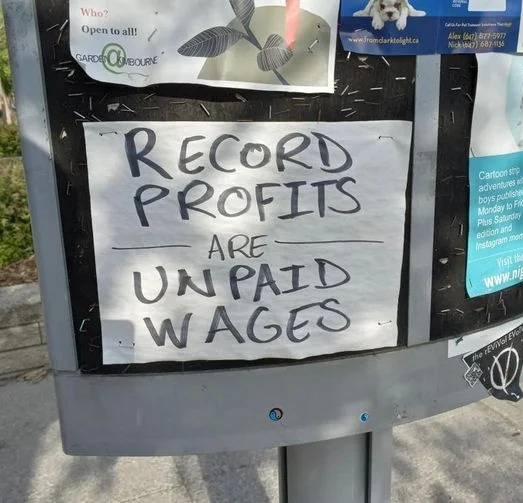
record profits are unpaid wages
#wages#workers vs capital#workers rights#labor vs capital#capital vs labor#labor rights#labor#price gouging
34K notes
·
View notes
Text




When Elon is shitty and utter inept but his actions unintentionally led to Eli Lilly and co facing a massive dose of karma and PR backlash that might make them back down on insulin price gouging.

“Eli Lilly and Co are reportedly furious with Elon.”
What is this, Freddie vs Jason for the corporate world?
#Elon musk#twitter#democrats#insulin#capitslism#gop#eli lilly and co#Diabetes#twitter humor#price gouging#larry david#horror movies#twitter blue#liberals
18K notes
·
View notes
Text
399 notes
·
View notes
Text
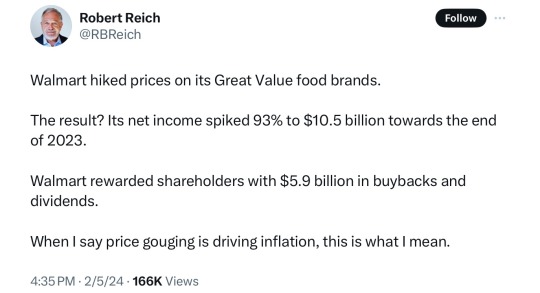
Walmart funds everything you are against. Walton family political operatives literally write the anti-abortion and other legislation that you protest. If you boycotted them for a few weeks instead of giving them your money we’d start to see some changes.
Don’t want to sacrifice? Think of all the pregnant women fleeing Texas, the trans youth being denied health care, the lgbt being legislated out of existence, and the African-American suffering from persecution and police brutality.
#boycott walmart#republican assholes#Robert reich#price gouging#price gouging is driving inflation#Walmart funds the Republicans
161 notes
·
View notes
Text
So, Kellogg's Boycott. Again.
Haven't seen any posts about it here yet, so figured I'd make one.
In short: We're all tired of these big companies gouging their prices just because they can, and calling it 'inflation.' We're tired of companies announcing record profits while they cut bonuses/lay people off/force workers to run on skeleton crews/etc. We're tired of "Shrinkflation" And we're tired of a bunch of other shit too, but you get my point.
So, vote with your wallet.
On April 1st, stop buying Kellogg's, and keep that up until June 30th. Just three months- just one quarter of the fiscal year. Companies report earnings each quarter, and if their earnings drop it will reflect in these quarterly reports.
Why Kellogg's?
Because their CEO recently pulled a "Let them eat cake."
TLDR; Kellogg's has raised prices by 28% across the board, bragged about record breaking profits, and then suggested that families struggling to afford groceries, because of aforementioned price gouging, just "eat cereal for dinner!"
And well, that message was not well received by anyone, as one could imagine. Pissed a lot of people off.
So yeah. The plan is to stop buying any Kellogg's products (below) for the entirety of the second quarter (April 1st-June 30th) and to collectively tell Kellogg to fuck off until they lower their prices.
The goal isn't to "destroy the company" or cost anyone their jobs- but we will hit them where they will listen. Their profits.
If they don't listen, then we don't come back, and we start in on the next company, and keep going until they all get the message.
There's always alternatives (more on that below) and we don't need them. If they refuse to drop their prices, then we just stick with the alternatives we found.
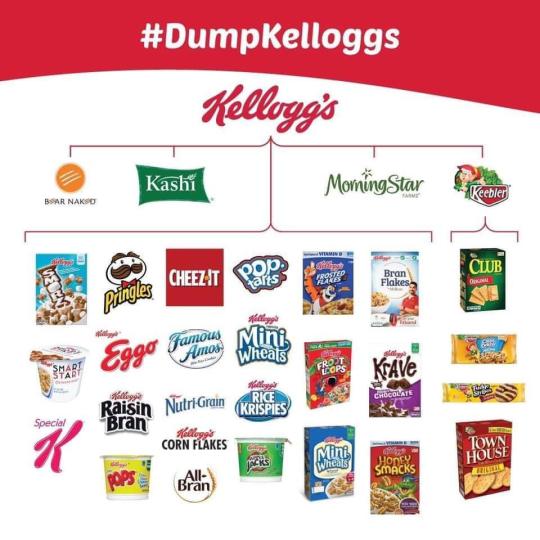

Three months is a minor inconvenience to teach a corporation a lesson, and we can do it.
So, take this month before April to find your alternatives. If you need help, I based a non-comprehensive list (below) off the image above. There's tons more just a google search away, and I bet others have made lists as well.
There's also always the option to make your own. There's tons of recipes online showing how to make dupes of your favorite products.
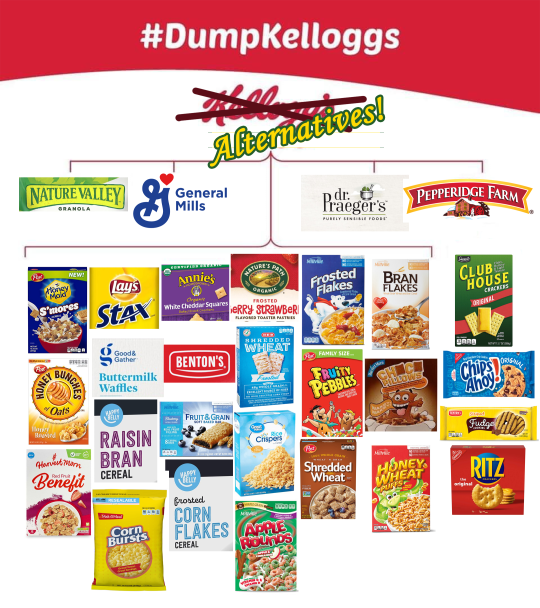
Some things to note:
Don't go stocking up on your favorite Kellogg's products the last week of March and think you're not crossing the picket line. The point is to make Kellogg's feel the loss in profits, and stocking up on Cheez-its beforehand will defeat the purpose. I sincerely promise you can make it three months without buying Kellogg's. Again, three months is a minor inconvenience to teach a corporation a lesson, and we can do it.
That said, Safe Foods are acknowledged. If you or your child is neurodivergent and has issues with food (i.e: literally won't be won't be able to eat at all without their safe food) you get a pass. By all means feel free to try and find alternatives, but it's very unlikely that the few who can't boycott will cause it to fail. There should be plenty of the rest of us to pick up the slack.
Don't be a bystander- meaning don't go about this thinking "Oh, well surely there's enough people boycotting that it's fine if I just-" No. If we ever want things to change then we need to be strong enough to do even something as small as not buying something we like for three months. Furthermore, it's on those of us who can afford Kellogg's products to boycott Kellogg's. It's not the responsibility of those who already can't afford Eggos to boycott Eggos. Nothing will change if you go about just assuming everyone else already has it handled for you. Take a stand.
And importantly, Spread the word. This only works if we let as many people as possible know about it.
So reblog this post, or make your own post, or both. Even feel free to copy and paste this entire post off-platform if you need to. I've also seen some suggest making flyers, or even just writing on post-it notes, and sticking them to Kellogg's products in the store to spread the word off-line.
Just get the word out there. If we ever want these companies to stop gouging us for every cent we've earned, then we have to make a stand somewhere.
If we do nothing it will only ever get worse.
#kelloggs boycott 2024#kelloggs#kelloggs boycott#corporate greed#boycott#eat the rich#ceo#let them eat cake#let them eat flakes#“Fuck you. Fools” day#fuck corporations#fuck capitalism#wendys#shrinkflation#price gouging#kelloggs ceo
125 notes
·
View notes
Text
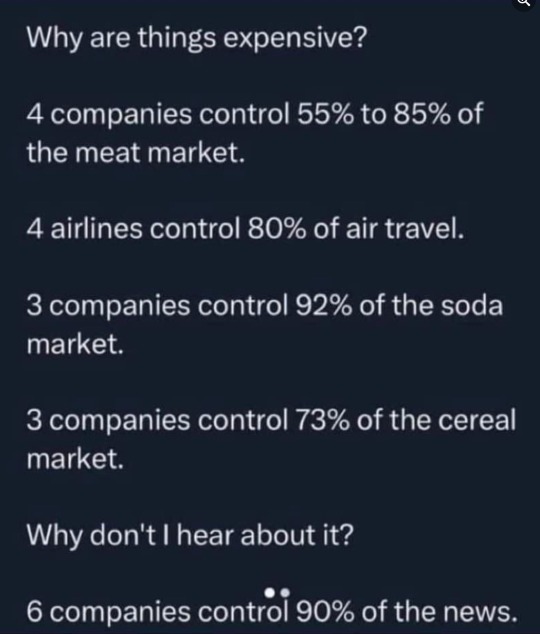
#Republican oligarchs#corporate greed#republican assholes#traitor trump#crooked donald#maga morons#never trump#resist#price gouging#late stage capitalism#wealth inequality
91 notes
·
View notes
Text
Protesters block traffic. Someone dies because they can't get to the hospital in time.
Corporate CEOs price gouge so they can increase profits. Someone dies because they can't afford their medicine.
If the first scenario fills you with bloodthirsty rage but the second scenario barely fazes you, ask yourself why. If you call for the protesters' heads on sticks but not the same for the CEOs, ask yourself why.
318 notes
·
View notes
Text
Greedflation, but for prisoners
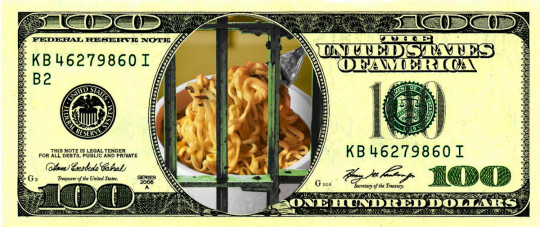
I'm touring my new, nationally bestselling novel The Bezzle! Catch me TOMORROW (Apr 21) in TORINO, then Marin County (Apr 27), Winnipeg (May 2), Calgary (May 3), Vancouver (May 4), and beyond!

Today in "Capitalists Hate Capitalism" news: The Appeal has published the first-ever survey of national prison commissary prices, revealing just how badly the prison profiteer system gouges American's all-time, world-record-beating prison population:
https://theappeal.org/locked-in-priced-out-how-much-prison-commissary-prices/
Like every aspect of the prison contracting system, prison commissaries – the stores where prisoners are able to buy food, sundries, toiletries and other items – are dominated by private equity funds that have bought out all the smaller players. Private equity deals always involve gigantic amounts of debt (typically, the first thing PE companies do after acquiring a company is to borrow heavily against it and then pay themselves a hefty dividend).
The need to service this debt drives PE companies to cut quality, squeeze suppliers, and raise prices. That's why PE loves to buy up the kinds of businesses you must spend your money at: dialysis clinics, long-term care facilities, funeral homes, and prison services.
Prisoners, after all, are a literal captive market. Unlike capitalist ventures, which involve the risk that a customer will take their business elsewhere, prison commissary providers have the most airtight of monopolies over prisoners' shopping.
Not that prisoners have a lot of money to spend. The 13th Amendment specifically allows for the enslavement of convicted criminals, and so even though many prisoners are subject to forced labor, they aren't necessarily paid for it:
https://pluralistic.net/2024/04/02/captive-customers/#guillotine-watch
Six states ban paying prisoners anything. North Carolina caps prisoners' pay at one dollar per day. Nationally, prisoners earn $0.52/hour, while producing $11b/year in goods and services:
https://www.dollarsandsense.org/archives/2024/0324bowman.html
So there's a double cruelty to prison commissary price-gouging. Prisoners earn far less than any other kind of worker, and they pay vastly inflated prices for the necessities of life. There's also a triple cruelty: prisoners' families – deprived of an incarcerated breadwinner's earnings – are called upon to make up the difference for jacked up commissary prices out of their own strained finances.
So what does prison profiteering look like, in dollars and sense? Here's the first-of-its-kind database tracking the costs of food, hygiene items and religious items in 46 states:
https://theappeal.org/commissary-database/
Prisoners rely heavily on commissaries for food. Prisons serve spoiled, inedible food, and often there isn't enough to go around – prisoners who rely on the food provided by their institutions literally starve. This is worst in prisons where private equity funds have taken over the cafeteria, which is inevitable accompanied by swingeing cuts to food quality and portions:
https://theappeal.org/prison-food-virginia-fluvanna-correctional-center/
So you have one private equity fund starving prisoners, and another that's gouging them on food. Or sometimes it's the same company. Keefe Group, owned by HIG Capital, provides commissaries to prisons whose cafeterias are managed by other HIG Capital portfolio companies like Trinity Services Group. HIG also owns the prison health-care company Wellpath – so if they give you food poisoning, they get paid twice.
Wellpath delivers "grossly inadequate healthcare":
https://theappeal.org/massachusetts-prisons-wellpath-dentures-teeth/
And Trinity serves "meager portions of inedible food":
https://theappeal.org/clayton-county-jail-sheriff-election/
When prison commissaries gouge on food, no part of the inventory is spared, even the cheapest items. In Florida, a packet of ramen costs $1.06, 300% more inside the prison than it does at the Target down the street:
https://www.documentcloud.org/documents/24444312-fl_doc_combined_commissary_lists#document/p6/a2444049
America's prisoners aren't just hungry, they're also hot. The climate emergency is sending temperatures in America's largely un-air-conditioned prisons soaring to dangerous levels. Commissaries capitalize on this, too: an 8" fan costs $40 in Delaware's Sussex Correctional Institution. In Georgia, that fan goes for $32 (but prisoners are not paid for their labor in Georgia pens). And in scorching Texas, the commissary raised the price of water by 50% last summer:
https://www.tpr.org/criminal-justice/2023-07-20/texas-charges-prisoners-50-more-for-water-for-as-heat-wave-continues
Toiletries are also sold at prices that would make an airport gift-shop blush. Need denture adhesive? That's $12.28 in an Idaho pen, triple the retail price. 15% of America's prisoners are over 55. The Keefe Group – sister company to the "grossly inadequate" healthcare company Wellpath – operates that commissary. In Oregon, the commissary charges a 200% markup on hearing-aid batteries. Vermont charges a 500% markup on reading glasses. Imagine spending decades in prison: toothless, blind, and deaf.
Then there's the religious items. Bibles and Christmas cards are surprisingly reasonable, but a Qaran will run you $26 in Vermont, where a Bible is a mere $4.55. Kufi caps – which cost $3 or less in the free world – go for $12 in Indiana prisons. A Virginia prisoner needs to work for 8 hours to earn enough to buy a commissary Ramadan card (you can buy a Christmas card after three hours' labor).
Prison price-gougers are finally facing a comeuppance. California's new BASIC Act caps prison commissary markups at 35% (California commissaries used to charge 63-200% markups):
https://theappeal.org/price-gouging-in-california-prisons-newsom-signature/
Last year, Nevada banned any markup on hygiene items:
https://www.leg.state.nv.us/App/NELIS/REL/82nd2023/Bill/10425/Overview
And prison tech monopolist Securus has been driven to the brink of bankruptcy, thanks to the activism of Worth Rises and its coalition partners:
https://pluralistic.net/2024/04/08/money-talks/
When someone tells you who they are, believe them the first time. Prisons show us how businesses would treat us if they could get away with it.

If you'd like an essay-formatted version of this post to read or share, here's a link to it on pluralistic.net, my surveillance-free, ad-free, tracker-free blog:
https://pluralistic.net/2024/04/20/captive-market/#locked-in
#pluralistic#carceral state#price gouging#greedflation#prisons#the bezzle#captive markets#capitalists hate capitalism#monopolies#the appeal#keefe group#hig capital#guillotine watch#wellpath#trinity services group#sussex correctional institute#cooked alive#air conditioning#climate change#idaho#oregon#freedom of religion#vermont#florida#kentucky#georgia#arkansas#wyoming#missouri#ramen
167 notes
·
View notes
Text

How I see the Apple Vision Pro
#memesdaily#funny memes#spicy memes#meme lord#memedaddy#meme page#dankest memes#dank memes#meme#memes#relatable memes#apple vision pro#funny post#funny shit#funny#price gouging#apple
59 notes
·
View notes
Text
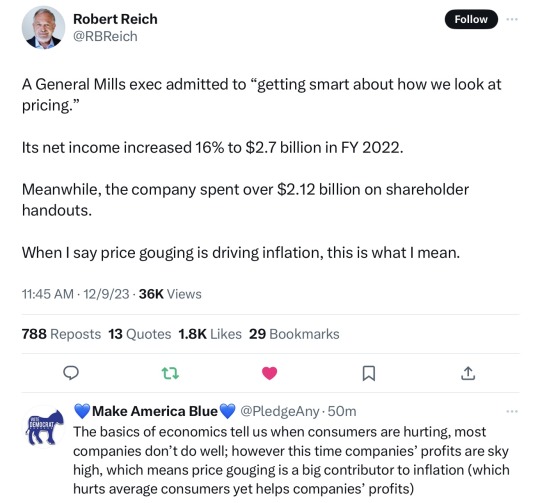
387 notes
·
View notes
Video
price gouging medication that was paid for by tax payers
#tiktok#drug prices#price gouging#Healthcare#Health Care#health insurance#medical news#medication#wealth inequality#hoarding wealth#wealth gap#wealth#billionaire#tax payer#tax payers#tax money#bernie sanders#vaccine apartheid#vaccines#COVID-19#the pandemic
278 notes
·
View notes
Text
the price gouging in fast food these days is fucking ridiculous but personally I feel it's a good thing that Five Guys has always been pricier than most because if it was cheaper I'd eat there more often and my arteries would look like mozzarella sticks by now
#ramblings#fast food#price gouging#economy#five guys#its legit my favorite fast food place but i only eat there like maybe once or twice a month at most
31 notes
·
View notes
Text
“From 2003-2016, bread prices rose steadily, far outpacing the minor increases in farmgate wheat prices,” NFU’s submission from last week explained. Farmgate prices are the prices of goods bought directly from farmers without markup added by retailers.
The union says the costs borne by consumers have been completely detached from the prices paid to farmers since the 2000s.
“Farmgate prices for wheat did increase in 2021 and 2022, potentially driven by the war in Ukraine and other factors. However, they did not come close to narrowing the gap that has steadily widened since the beginning of this data series.”
[...]
Five retailers—Loblaw, Sobeys, Metro, Costco and Walmart—control 75 per cent of Canada’s food retail market. In processing, the Canadian market is even more consolidated in some cases. Just two corporations—one of which was owned by Loblaw parent company George Weston Ltd. until recently—control 80 per cent of the bread-making market, for example.
The result is that farmers are facing dire financial circumstances, Pfenning said. They’re struggling with increased costs for virtually everything they need to grow food: land, equipment, soil amendments and more. Yet the prices they’re paid are virtually stagnant.
“Farmers and consumers are clearly in the same boat,” NFU vice president Stewart Wells said in a press release about the new data, “dealing with a highly consolidated processing and retail sector that can set prices to suit themselves and award enormous salaries to corporate CEOs.”
78 notes
·
View notes

